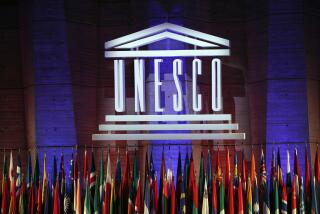U.N. University Seeks Funds From U.S.
- Share via
TOKYO — The United Nations University has been working for 15 years to become a center for academic solutions to global problems but has won scant recognition and no funding from the United States.
It’s not for lack of trying.
Dedicated to the idea that peace can only be advanced through development, U.N. University fellows have put their skills to use in every corner of the world.
The university has no campus, no faculty and no students, in the traditional sense.
The core of the university’s work is done by the 1,600 research fellows it has funded from 114 countries.
In Nicaragua, they developed a process for turning vegetable fiber into charcoal to power a special automobile engine.
In Nepal, fellows mapped out natural hazards to locate areas of potential landslides and avalanches.
In India, a university project developed simple comic book manuals to teach skills needed to improve food, water, housing and health management in villages.
The list goes on. But despite the many successes, the United States has turned down repeated requests to aid the university.
President Carter supported funding for the university during his term, but Congress balked. President Reagan, who cut U.S. funding for UNESCO, put a damper on any new allocations to U.N. agencies.
But U.N. University is hopeful that with the Cold War ending and more attention being focused on development and environment, the United States will see the value of the university’s work.
“We are going to try again,” said Heitor Gurgulino de Souza, a Brazilian educator and the university’s rector.
Meanwhile, Japan has provided $100 million for operating expenses plus at least $80 million for the construction of a permanent headquarters in central Tokyo.
Finland, where the U.N. University World Institute for Development Economics Research is located, has contributed $25 million.
The only U.N. University center located in the Third World, the Institute for Natural Resources in Africa, is in the Ivory Coast.
The Ivory Coast has pledged to donate $5 million to the university, the highest among any developing country except oil-rich Venezuela.
The United Nations itself gives no financial support to the university that bears its name. The university is left to raise money from U.N. member countries.
As of June, 47 nations had contributed or pledged a total of $210 million to the university.
The university hopes to turn the contributions into a vehicle for peace in the post-Cold War era.
U.N. University, founded in 1975, aims to bridge the economic gap by bringing together the world’s intellectual resources with the people who need them most.
“Much of the world’s knowledge lies unused behind walls of ignorance, indifference and inefficiency,” says the university’s public relations literature. “The U.N. University seeks to breach these walls and channel knowledge where it is most needed.”
Part of the problem lies in the fact that the intellectual resources are concentrated in the richest countries.
The university itself is constricted by this reality. Its headquarters and main facilities are in the countries that have donated the most money--Japan and Finland.
That is because one of the main selling points the university can offer a potential donor is to locate a facility in the donor’s country.
To build a presence in poorer countries, the university carries out much of its work away from the main facilities.
The 82 employees in Tokyo and 14 in Helsinki coordinate research and training projects around the world.
“No matter how beautiful of a book I have published here in English, it will never reach a poor farmer in Brazil who cannot even read Portuguese,” Gurgulino said.
The U.N. University was first proposed in 1969 by U.N. Secretary General U Thant. In 1973, the concept was adopted by the U.N. General Assembly, and in 1975 the university opened its doors.
To commemorate its 15th year, the university will be host to three major conferences in Tokyo this fall and winter.
More to Read
Sign up for Essential California
The most important California stories and recommendations in your inbox every morning.
You may occasionally receive promotional content from the Los Angeles Times.













